Analyzing the Principles of Care and Vulnerable People Protection
VerifiedAdded on 2023/06/06
|12
|3951
|376
Report
AI Summary
This report provides a detailed analysis of the principles of care within healthcare settings, emphasizing their importance in ensuring patient safety, dignity, and independence. It explores the five core principles: privacy, communication, safety, independence, and dignity, and how these principles empower vulnerable adults by promoting their participation in safeguarding processes. The report also addresses the six principles for safeguarding vulnerable adults, including empowerment, prevention, proportionality, protection, partnership, and accountability, as outlined in the 2014 act. Furthermore, it examines the challenges in healthcare, such as medical errors, lack of communication, staff shortages, and the impact of poverty on healthcare access. The report also highlights the role of legislation, including the Care Act 2014, the Safeguarding Act 2006, the Health and Social Care Act 2012, and the Mental Capacity Act 2005, in protecting vulnerable individuals and ensuring quality care. The report concludes by emphasizing the need for trained professionals, advanced technology, and accessible transportation to improve healthcare outcomes.
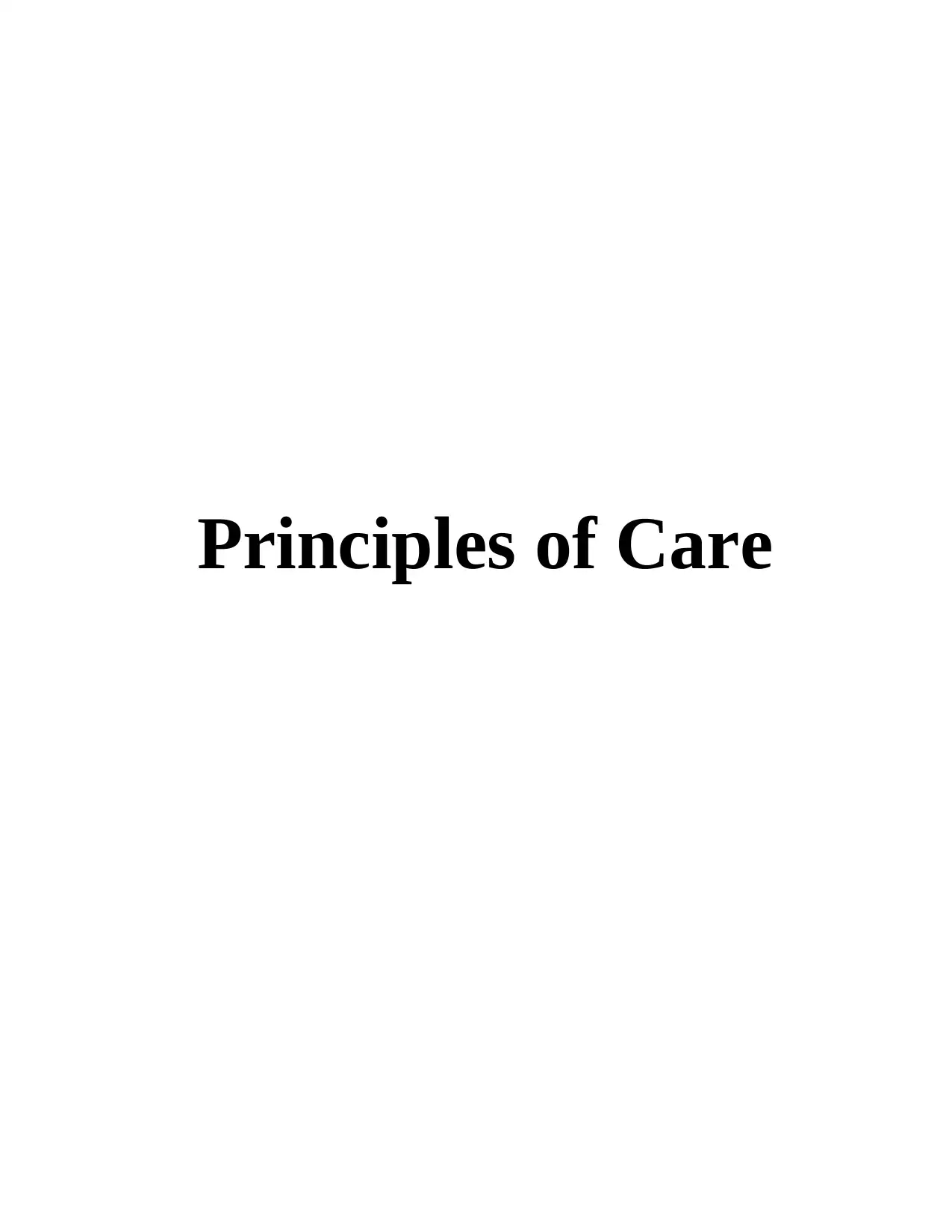
Principles of Care
Paraphrase This Document
Need a fresh take? Get an instant paraphrase of this document with our AI Paraphraser
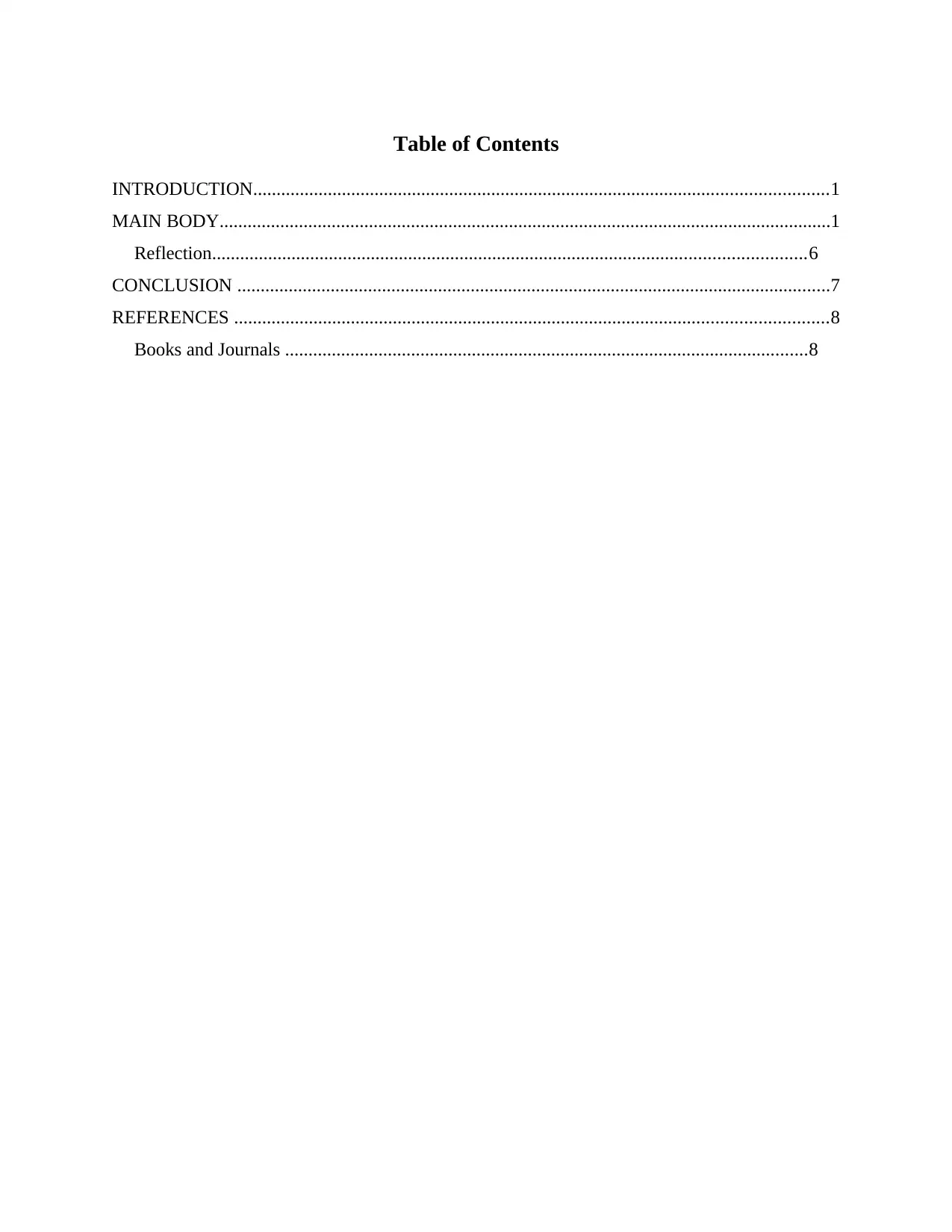
Table of Contents
INTRODUCTION...........................................................................................................................1
MAIN BODY...................................................................................................................................1
Reflection...............................................................................................................................6
CONCLUSION ...............................................................................................................................7
REFERENCES ...............................................................................................................................8
Books and Journals ................................................................................................................8
INTRODUCTION...........................................................................................................................1
MAIN BODY...................................................................................................................................1
Reflection...............................................................................................................................6
CONCLUSION ...............................................................................................................................7
REFERENCES ...............................................................................................................................8
Books and Journals ................................................................................................................8
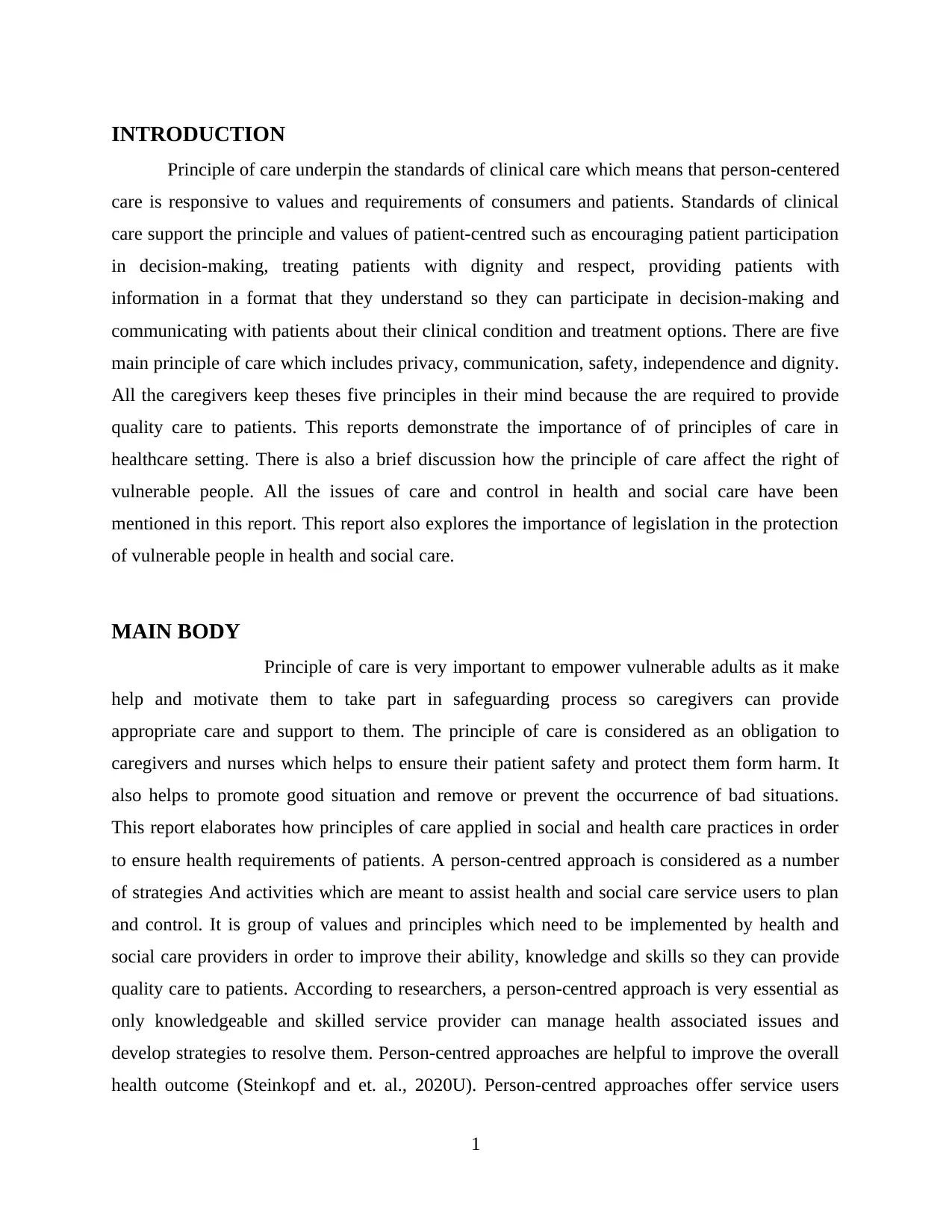
INTRODUCTION
Principle of care underpin the standards of clinical care which means that person-centered
care is responsive to values and requirements of consumers and patients. Standards of clinical
care support the principle and values of patient-centred such as encouraging patient participation
in decision-making, treating patients with dignity and respect, providing patients with
information in a format that they understand so they can participate in decision-making and
communicating with patients about their clinical condition and treatment options. There are five
main principle of care which includes privacy, communication, safety, independence and dignity.
All the caregivers keep theses five principles in their mind because the are required to provide
quality care to patients. This reports demonstrate the importance of of principles of care in
healthcare setting. There is also a brief discussion how the principle of care affect the right of
vulnerable people. All the issues of care and control in health and social care have been
mentioned in this report. This report also explores the importance of legislation in the protection
of vulnerable people in health and social care.
MAIN BODY
Principle of care is very important to empower vulnerable adults as it make
help and motivate them to take part in safeguarding process so caregivers can provide
appropriate care and support to them. The principle of care is considered as an obligation to
caregivers and nurses which helps to ensure their patient safety and protect them form harm. It
also helps to promote good situation and remove or prevent the occurrence of bad situations.
This report elaborates how principles of care applied in social and health care practices in order
to ensure health requirements of patients. A person-centred approach is considered as a number
of strategies And activities which are meant to assist health and social care service users to plan
and control. It is group of values and principles which need to be implemented by health and
social care providers in order to improve their ability, knowledge and skills so they can provide
quality care to patients. According to researchers, a person-centred approach is very essential as
only knowledgeable and skilled service provider can manage health associated issues and
develop strategies to resolve them. Person-centred approaches are helpful to improve the overall
health outcome (Steinkopf and et. al., 2020U). Person-centred approaches offer service users
1
Principle of care underpin the standards of clinical care which means that person-centered
care is responsive to values and requirements of consumers and patients. Standards of clinical
care support the principle and values of patient-centred such as encouraging patient participation
in decision-making, treating patients with dignity and respect, providing patients with
information in a format that they understand so they can participate in decision-making and
communicating with patients about their clinical condition and treatment options. There are five
main principle of care which includes privacy, communication, safety, independence and dignity.
All the caregivers keep theses five principles in their mind because the are required to provide
quality care to patients. This reports demonstrate the importance of of principles of care in
healthcare setting. There is also a brief discussion how the principle of care affect the right of
vulnerable people. All the issues of care and control in health and social care have been
mentioned in this report. This report also explores the importance of legislation in the protection
of vulnerable people in health and social care.
MAIN BODY
Principle of care is very important to empower vulnerable adults as it make
help and motivate them to take part in safeguarding process so caregivers can provide
appropriate care and support to them. The principle of care is considered as an obligation to
caregivers and nurses which helps to ensure their patient safety and protect them form harm. It
also helps to promote good situation and remove or prevent the occurrence of bad situations.
This report elaborates how principles of care applied in social and health care practices in order
to ensure health requirements of patients. A person-centred approach is considered as a number
of strategies And activities which are meant to assist health and social care service users to plan
and control. It is group of values and principles which need to be implemented by health and
social care providers in order to improve their ability, knowledge and skills so they can provide
quality care to patients. According to researchers, a person-centred approach is very essential as
only knowledgeable and skilled service provider can manage health associated issues and
develop strategies to resolve them. Person-centred approaches are helpful to improve the overall
health outcome (Steinkopf and et. al., 2020U). Person-centred approaches offer service users
1
⊘ This is a preview!⊘
Do you want full access?
Subscribe today to unlock all pages.

Trusted by 1+ million students worldwide
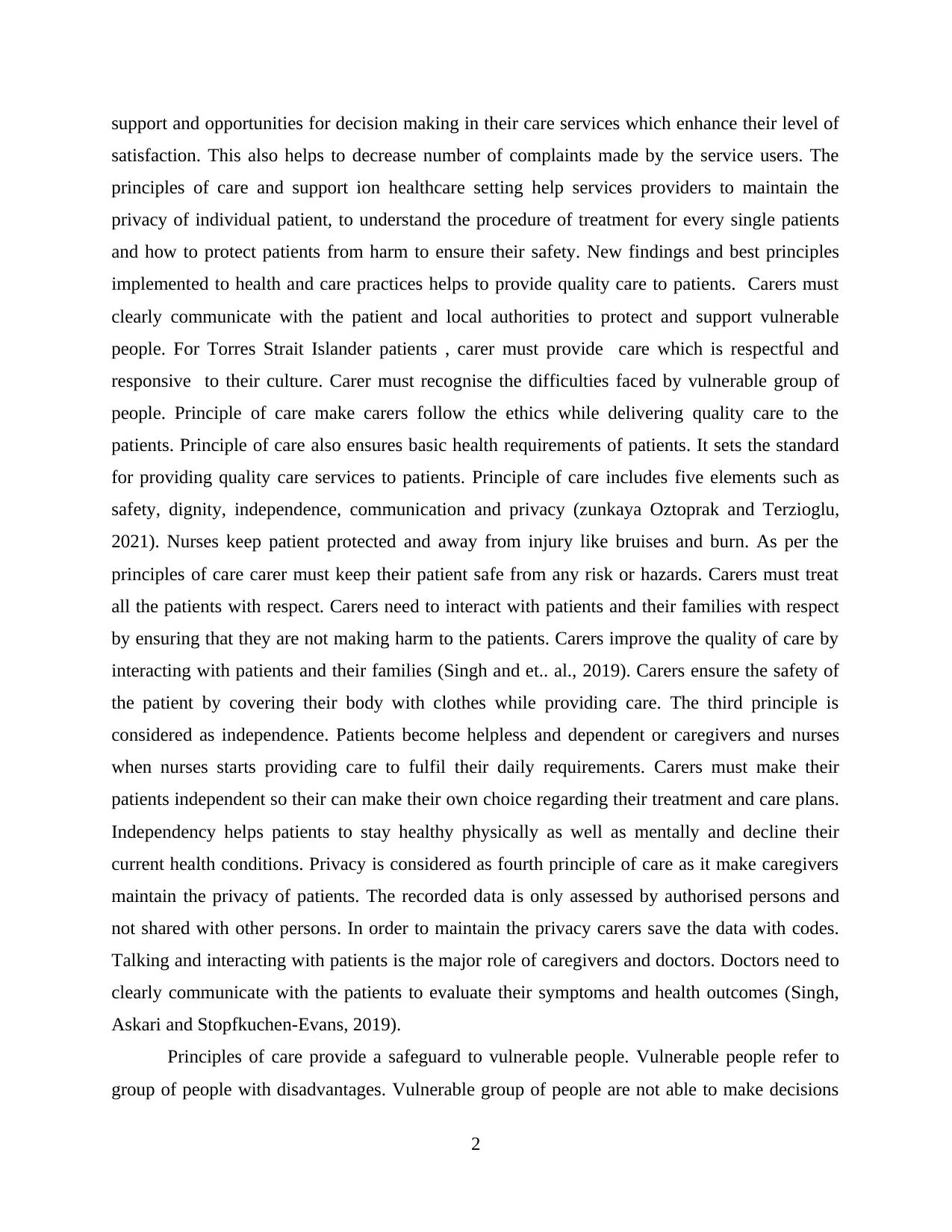
support and opportunities for decision making in their care services which enhance their level of
satisfaction. This also helps to decrease number of complaints made by the service users. The
principles of care and support ion healthcare setting help services providers to maintain the
privacy of individual patient, to understand the procedure of treatment for every single patients
and how to protect patients from harm to ensure their safety. New findings and best principles
implemented to health and care practices helps to provide quality care to patients. Carers must
clearly communicate with the patient and local authorities to protect and support vulnerable
people. For Torres Strait Islander patients , carer must provide care which is respectful and
responsive to their culture. Carer must recognise the difficulties faced by vulnerable group of
people. Principle of care make carers follow the ethics while delivering quality care to the
patients. Principle of care also ensures basic health requirements of patients. It sets the standard
for providing quality care services to patients. Principle of care includes five elements such as
safety, dignity, independence, communication and privacy (zunkaya Oztoprak and Terzioglu,
2021). Nurses keep patient protected and away from injury like bruises and burn. As per the
principles of care carer must keep their patient safe from any risk or hazards. Carers must treat
all the patients with respect. Carers need to interact with patients and their families with respect
by ensuring that they are not making harm to the patients. Carers improve the quality of care by
interacting with patients and their families (Singh and et.. al., 2019). Carers ensure the safety of
the patient by covering their body with clothes while providing care. The third principle is
considered as independence. Patients become helpless and dependent or caregivers and nurses
when nurses starts providing care to fulfil their daily requirements. Carers must make their
patients independent so their can make their own choice regarding their treatment and care plans.
Independency helps patients to stay healthy physically as well as mentally and decline their
current health conditions. Privacy is considered as fourth principle of care as it make caregivers
maintain the privacy of patients. The recorded data is only assessed by authorised persons and
not shared with other persons. In order to maintain the privacy carers save the data with codes.
Talking and interacting with patients is the major role of caregivers and doctors. Doctors need to
clearly communicate with the patients to evaluate their symptoms and health outcomes (Singh,
Askari and Stopfkuchen-Evans, 2019).
Principles of care provide a safeguard to vulnerable people. Vulnerable people refer to
group of people with disadvantages. Vulnerable group of people are not able to make decisions
2
satisfaction. This also helps to decrease number of complaints made by the service users. The
principles of care and support ion healthcare setting help services providers to maintain the
privacy of individual patient, to understand the procedure of treatment for every single patients
and how to protect patients from harm to ensure their safety. New findings and best principles
implemented to health and care practices helps to provide quality care to patients. Carers must
clearly communicate with the patient and local authorities to protect and support vulnerable
people. For Torres Strait Islander patients , carer must provide care which is respectful and
responsive to their culture. Carer must recognise the difficulties faced by vulnerable group of
people. Principle of care make carers follow the ethics while delivering quality care to the
patients. Principle of care also ensures basic health requirements of patients. It sets the standard
for providing quality care services to patients. Principle of care includes five elements such as
safety, dignity, independence, communication and privacy (zunkaya Oztoprak and Terzioglu,
2021). Nurses keep patient protected and away from injury like bruises and burn. As per the
principles of care carer must keep their patient safe from any risk or hazards. Carers must treat
all the patients with respect. Carers need to interact with patients and their families with respect
by ensuring that they are not making harm to the patients. Carers improve the quality of care by
interacting with patients and their families (Singh and et.. al., 2019). Carers ensure the safety of
the patient by covering their body with clothes while providing care. The third principle is
considered as independence. Patients become helpless and dependent or caregivers and nurses
when nurses starts providing care to fulfil their daily requirements. Carers must make their
patients independent so their can make their own choice regarding their treatment and care plans.
Independency helps patients to stay healthy physically as well as mentally and decline their
current health conditions. Privacy is considered as fourth principle of care as it make caregivers
maintain the privacy of patients. The recorded data is only assessed by authorised persons and
not shared with other persons. In order to maintain the privacy carers save the data with codes.
Talking and interacting with patients is the major role of caregivers and doctors. Doctors need to
clearly communicate with the patients to evaluate their symptoms and health outcomes (Singh,
Askari and Stopfkuchen-Evans, 2019).
Principles of care provide a safeguard to vulnerable people. Vulnerable people refer to
group of people with disadvantages. Vulnerable group of people are not able to make decisions
2
Paraphrase This Document
Need a fresh take? Get an instant paraphrase of this document with our AI Paraphraser
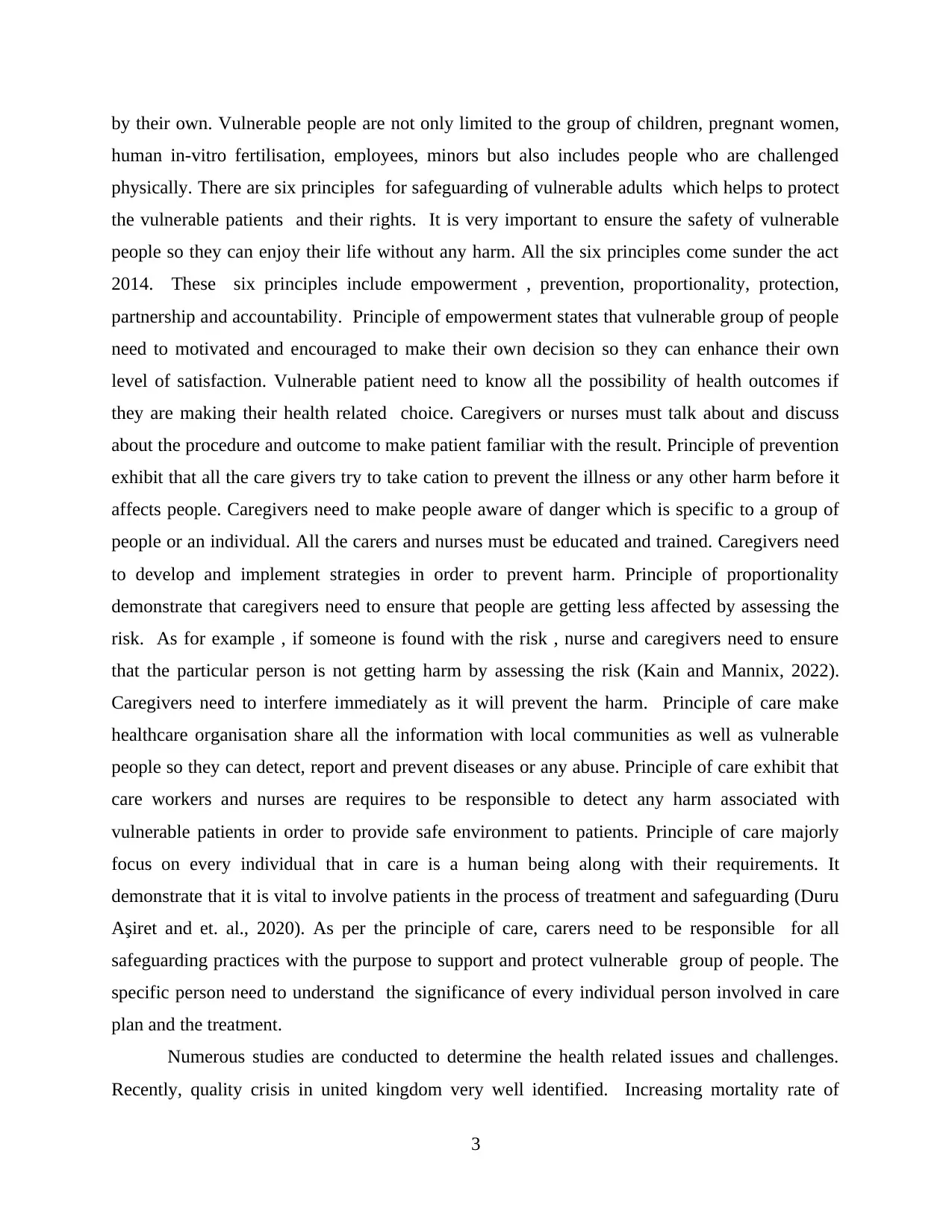
by their own. Vulnerable people are not only limited to the group of children, pregnant women,
human in-vitro fertilisation, employees, minors but also includes people who are challenged
physically. There are six principles for safeguarding of vulnerable adults which helps to protect
the vulnerable patients and their rights. It is very important to ensure the safety of vulnerable
people so they can enjoy their life without any harm. All the six principles come sunder the act
2014. These six principles include empowerment , prevention, proportionality, protection,
partnership and accountability. Principle of empowerment states that vulnerable group of people
need to motivated and encouraged to make their own decision so they can enhance their own
level of satisfaction. Vulnerable patient need to know all the possibility of health outcomes if
they are making their health related choice. Caregivers or nurses must talk about and discuss
about the procedure and outcome to make patient familiar with the result. Principle of prevention
exhibit that all the care givers try to take cation to prevent the illness or any other harm before it
affects people. Caregivers need to make people aware of danger which is specific to a group of
people or an individual. All the carers and nurses must be educated and trained. Caregivers need
to develop and implement strategies in order to prevent harm. Principle of proportionality
demonstrate that caregivers need to ensure that people are getting less affected by assessing the
risk. As for example , if someone is found with the risk , nurse and caregivers need to ensure
that the particular person is not getting harm by assessing the risk (Kain and Mannix, 2022).
Caregivers need to interfere immediately as it will prevent the harm. Principle of care make
healthcare organisation share all the information with local communities as well as vulnerable
people so they can detect, report and prevent diseases or any abuse. Principle of care exhibit that
care workers and nurses are requires to be responsible to detect any harm associated with
vulnerable patients in order to provide safe environment to patients. Principle of care majorly
focus on every individual that in care is a human being along with their requirements. It
demonstrate that it is vital to involve patients in the process of treatment and safeguarding (Duru
Aşiret and et. al., 2020). As per the principle of care, carers need to be responsible for all
safeguarding practices with the purpose to support and protect vulnerable group of people. The
specific person need to understand the significance of every individual person involved in care
plan and the treatment.
Numerous studies are conducted to determine the health related issues and challenges.
Recently, quality crisis in united kingdom very well identified. Increasing mortality rate of
3
human in-vitro fertilisation, employees, minors but also includes people who are challenged
physically. There are six principles for safeguarding of vulnerable adults which helps to protect
the vulnerable patients and their rights. It is very important to ensure the safety of vulnerable
people so they can enjoy their life without any harm. All the six principles come sunder the act
2014. These six principles include empowerment , prevention, proportionality, protection,
partnership and accountability. Principle of empowerment states that vulnerable group of people
need to motivated and encouraged to make their own decision so they can enhance their own
level of satisfaction. Vulnerable patient need to know all the possibility of health outcomes if
they are making their health related choice. Caregivers or nurses must talk about and discuss
about the procedure and outcome to make patient familiar with the result. Principle of prevention
exhibit that all the care givers try to take cation to prevent the illness or any other harm before it
affects people. Caregivers need to make people aware of danger which is specific to a group of
people or an individual. All the carers and nurses must be educated and trained. Caregivers need
to develop and implement strategies in order to prevent harm. Principle of proportionality
demonstrate that caregivers need to ensure that people are getting less affected by assessing the
risk. As for example , if someone is found with the risk , nurse and caregivers need to ensure
that the particular person is not getting harm by assessing the risk (Kain and Mannix, 2022).
Caregivers need to interfere immediately as it will prevent the harm. Principle of care make
healthcare organisation share all the information with local communities as well as vulnerable
people so they can detect, report and prevent diseases or any abuse. Principle of care exhibit that
care workers and nurses are requires to be responsible to detect any harm associated with
vulnerable patients in order to provide safe environment to patients. Principle of care majorly
focus on every individual that in care is a human being along with their requirements. It
demonstrate that it is vital to involve patients in the process of treatment and safeguarding (Duru
Aşiret and et. al., 2020). As per the principle of care, carers need to be responsible for all
safeguarding practices with the purpose to support and protect vulnerable group of people. The
specific person need to understand the significance of every individual person involved in care
plan and the treatment.
Numerous studies are conducted to determine the health related issues and challenges.
Recently, quality crisis in united kingdom very well identified. Increasing mortality rate of
3
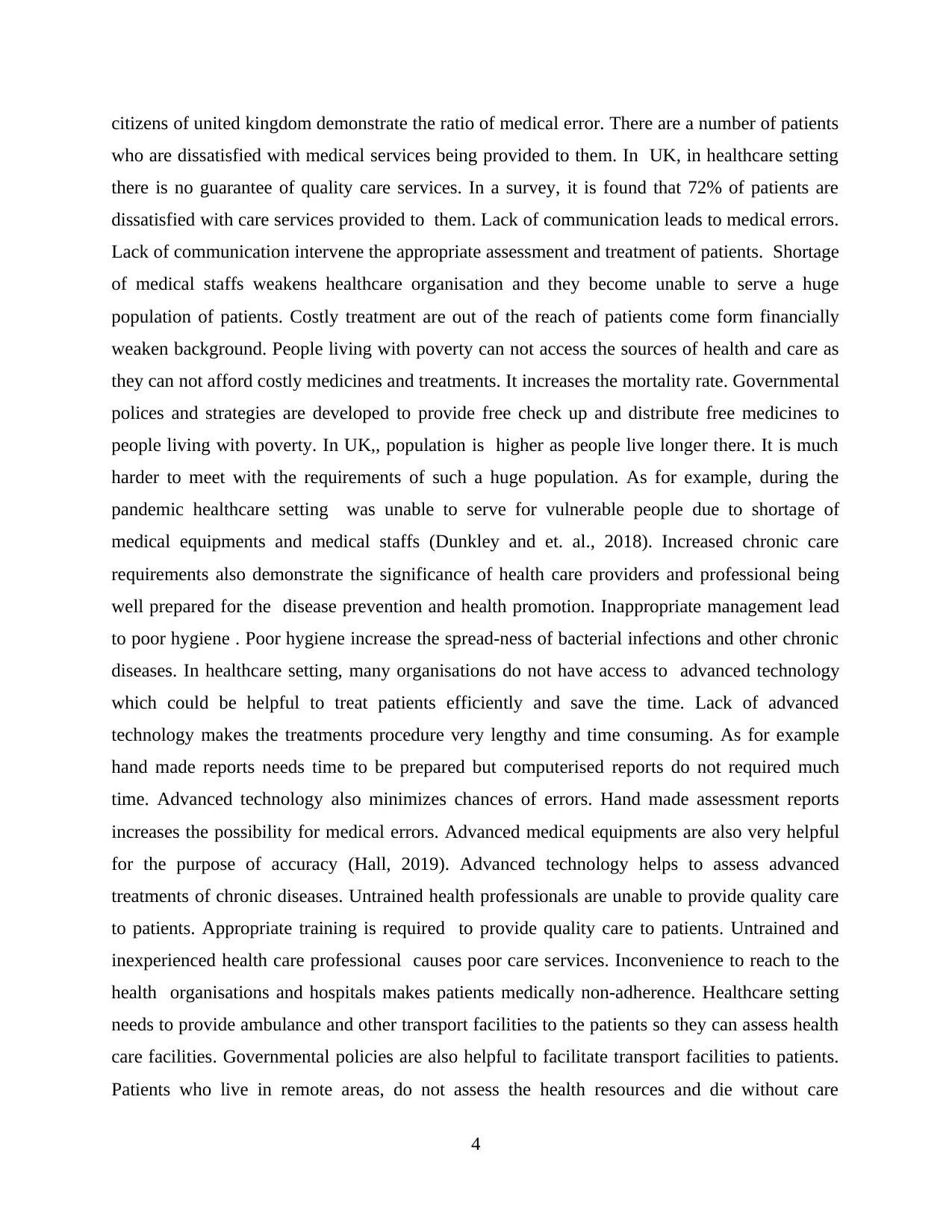
citizens of united kingdom demonstrate the ratio of medical error. There are a number of patients
who are dissatisfied with medical services being provided to them. In UK, in healthcare setting
there is no guarantee of quality care services. In a survey, it is found that 72% of patients are
dissatisfied with care services provided to them. Lack of communication leads to medical errors.
Lack of communication intervene the appropriate assessment and treatment of patients. Shortage
of medical staffs weakens healthcare organisation and they become unable to serve a huge
population of patients. Costly treatment are out of the reach of patients come form financially
weaken background. People living with poverty can not access the sources of health and care as
they can not afford costly medicines and treatments. It increases the mortality rate. Governmental
polices and strategies are developed to provide free check up and distribute free medicines to
people living with poverty. In UK,, population is higher as people live longer there. It is much
harder to meet with the requirements of such a huge population. As for example, during the
pandemic healthcare setting was unable to serve for vulnerable people due to shortage of
medical equipments and medical staffs (Dunkley and et. al., 2018). Increased chronic care
requirements also demonstrate the significance of health care providers and professional being
well prepared for the disease prevention and health promotion. Inappropriate management lead
to poor hygiene . Poor hygiene increase the spread-ness of bacterial infections and other chronic
diseases. In healthcare setting, many organisations do not have access to advanced technology
which could be helpful to treat patients efficiently and save the time. Lack of advanced
technology makes the treatments procedure very lengthy and time consuming. As for example
hand made reports needs time to be prepared but computerised reports do not required much
time. Advanced technology also minimizes chances of errors. Hand made assessment reports
increases the possibility for medical errors. Advanced medical equipments are also very helpful
for the purpose of accuracy (Hall, 2019). Advanced technology helps to assess advanced
treatments of chronic diseases. Untrained health professionals are unable to provide quality care
to patients. Appropriate training is required to provide quality care to patients. Untrained and
inexperienced health care professional causes poor care services. Inconvenience to reach to the
health organisations and hospitals makes patients medically non-adherence. Healthcare setting
needs to provide ambulance and other transport facilities to the patients so they can assess health
care facilities. Governmental policies are also helpful to facilitate transport facilities to patients.
Patients who live in remote areas, do not assess the health resources and die without care
4
who are dissatisfied with medical services being provided to them. In UK, in healthcare setting
there is no guarantee of quality care services. In a survey, it is found that 72% of patients are
dissatisfied with care services provided to them. Lack of communication leads to medical errors.
Lack of communication intervene the appropriate assessment and treatment of patients. Shortage
of medical staffs weakens healthcare organisation and they become unable to serve a huge
population of patients. Costly treatment are out of the reach of patients come form financially
weaken background. People living with poverty can not access the sources of health and care as
they can not afford costly medicines and treatments. It increases the mortality rate. Governmental
polices and strategies are developed to provide free check up and distribute free medicines to
people living with poverty. In UK,, population is higher as people live longer there. It is much
harder to meet with the requirements of such a huge population. As for example, during the
pandemic healthcare setting was unable to serve for vulnerable people due to shortage of
medical equipments and medical staffs (Dunkley and et. al., 2018). Increased chronic care
requirements also demonstrate the significance of health care providers and professional being
well prepared for the disease prevention and health promotion. Inappropriate management lead
to poor hygiene . Poor hygiene increase the spread-ness of bacterial infections and other chronic
diseases. In healthcare setting, many organisations do not have access to advanced technology
which could be helpful to treat patients efficiently and save the time. Lack of advanced
technology makes the treatments procedure very lengthy and time consuming. As for example
hand made reports needs time to be prepared but computerised reports do not required much
time. Advanced technology also minimizes chances of errors. Hand made assessment reports
increases the possibility for medical errors. Advanced medical equipments are also very helpful
for the purpose of accuracy (Hall, 2019). Advanced technology helps to assess advanced
treatments of chronic diseases. Untrained health professionals are unable to provide quality care
to patients. Appropriate training is required to provide quality care to patients. Untrained and
inexperienced health care professional causes poor care services. Inconvenience to reach to the
health organisations and hospitals makes patients medically non-adherence. Healthcare setting
needs to provide ambulance and other transport facilities to the patients so they can assess health
care facilities. Governmental policies are also helpful to facilitate transport facilities to patients.
Patients who live in remote areas, do not assess the health resources and die without care
4
⊘ This is a preview!⊘
Do you want full access?
Subscribe today to unlock all pages.

Trusted by 1+ million students worldwide
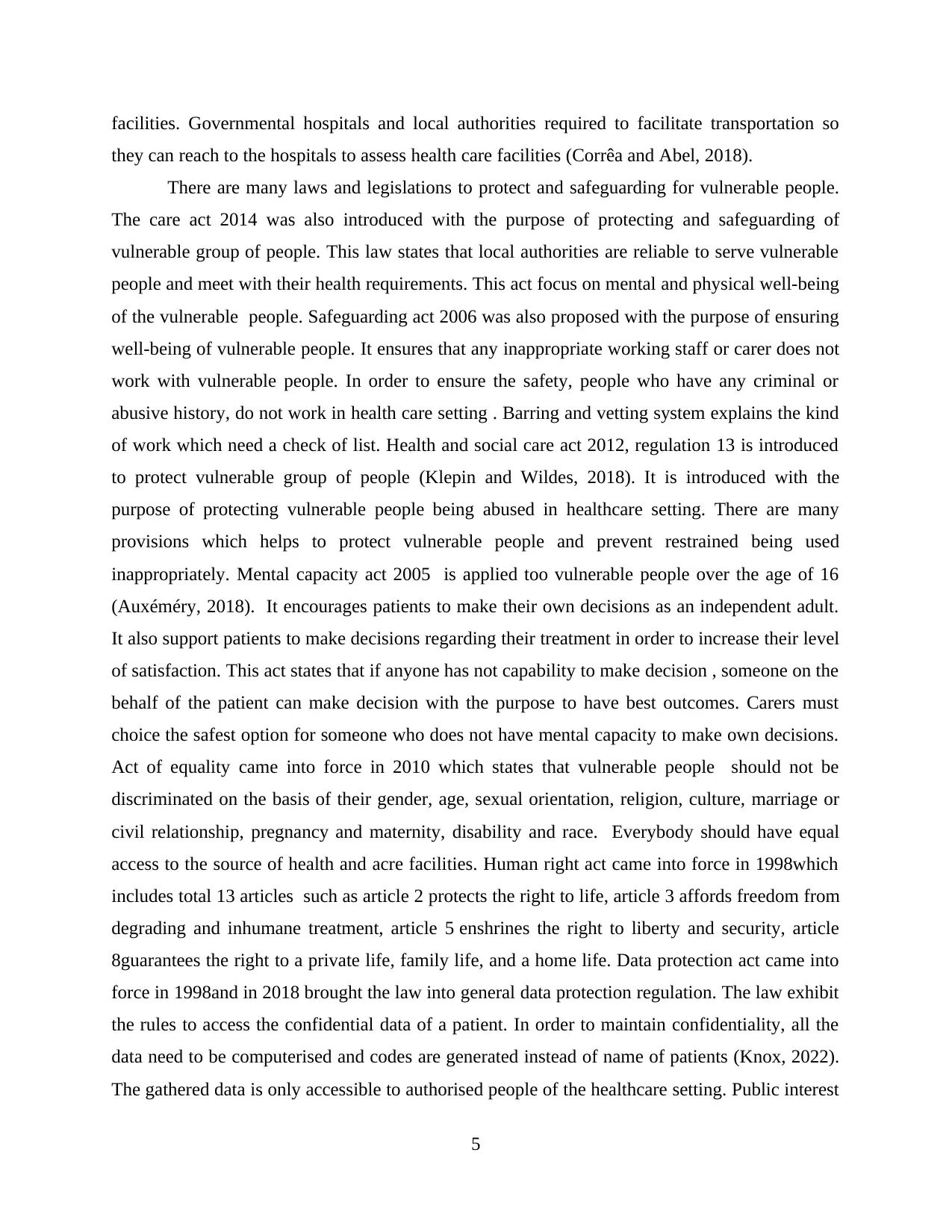
facilities. Governmental hospitals and local authorities required to facilitate transportation so
they can reach to the hospitals to assess health care facilities (Corrêa and Abel, 2018).
There are many laws and legislations to protect and safeguarding for vulnerable people.
The care act 2014 was also introduced with the purpose of protecting and safeguarding of
vulnerable group of people. This law states that local authorities are reliable to serve vulnerable
people and meet with their health requirements. This act focus on mental and physical well-being
of the vulnerable people. Safeguarding act 2006 was also proposed with the purpose of ensuring
well-being of vulnerable people. It ensures that any inappropriate working staff or carer does not
work with vulnerable people. In order to ensure the safety, people who have any criminal or
abusive history, do not work in health care setting . Barring and vetting system explains the kind
of work which need a check of list. Health and social care act 2012, regulation 13 is introduced
to protect vulnerable group of people (Klepin and Wildes, 2018). It is introduced with the
purpose of protecting vulnerable people being abused in healthcare setting. There are many
provisions which helps to protect vulnerable people and prevent restrained being used
inappropriately. Mental capacity act 2005 is applied too vulnerable people over the age of 16
(Auxéméry, 2018). It encourages patients to make their own decisions as an independent adult.
It also support patients to make decisions regarding their treatment in order to increase their level
of satisfaction. This act states that if anyone has not capability to make decision , someone on the
behalf of the patient can make decision with the purpose to have best outcomes. Carers must
choice the safest option for someone who does not have mental capacity to make own decisions.
Act of equality came into force in 2010 which states that vulnerable people should not be
discriminated on the basis of their gender, age, sexual orientation, religion, culture, marriage or
civil relationship, pregnancy and maternity, disability and race. Everybody should have equal
access to the source of health and acre facilities. Human right act came into force in 1998which
includes total 13 articles such as article 2 protects the right to life, article 3 affords freedom from
degrading and inhumane treatment, article 5 enshrines the right to liberty and security, article
8guarantees the right to a private life, family life, and a home life. Data protection act came into
force in 1998and in 2018 brought the law into general data protection regulation. The law exhibit
the rules to access the confidential data of a patient. In order to maintain confidentiality, all the
data need to be computerised and codes are generated instead of name of patients (Knox, 2022).
The gathered data is only accessible to authorised people of the healthcare setting. Public interest
5
they can reach to the hospitals to assess health care facilities (Corrêa and Abel, 2018).
There are many laws and legislations to protect and safeguarding for vulnerable people.
The care act 2014 was also introduced with the purpose of protecting and safeguarding of
vulnerable group of people. This law states that local authorities are reliable to serve vulnerable
people and meet with their health requirements. This act focus on mental and physical well-being
of the vulnerable people. Safeguarding act 2006 was also proposed with the purpose of ensuring
well-being of vulnerable people. It ensures that any inappropriate working staff or carer does not
work with vulnerable people. In order to ensure the safety, people who have any criminal or
abusive history, do not work in health care setting . Barring and vetting system explains the kind
of work which need a check of list. Health and social care act 2012, regulation 13 is introduced
to protect vulnerable group of people (Klepin and Wildes, 2018). It is introduced with the
purpose of protecting vulnerable people being abused in healthcare setting. There are many
provisions which helps to protect vulnerable people and prevent restrained being used
inappropriately. Mental capacity act 2005 is applied too vulnerable people over the age of 16
(Auxéméry, 2018). It encourages patients to make their own decisions as an independent adult.
It also support patients to make decisions regarding their treatment in order to increase their level
of satisfaction. This act states that if anyone has not capability to make decision , someone on the
behalf of the patient can make decision with the purpose to have best outcomes. Carers must
choice the safest option for someone who does not have mental capacity to make own decisions.
Act of equality came into force in 2010 which states that vulnerable people should not be
discriminated on the basis of their gender, age, sexual orientation, religion, culture, marriage or
civil relationship, pregnancy and maternity, disability and race. Everybody should have equal
access to the source of health and acre facilities. Human right act came into force in 1998which
includes total 13 articles such as article 2 protects the right to life, article 3 affords freedom from
degrading and inhumane treatment, article 5 enshrines the right to liberty and security, article
8guarantees the right to a private life, family life, and a home life. Data protection act came into
force in 1998and in 2018 brought the law into general data protection regulation. The law exhibit
the rules to access the confidential data of a patient. In order to maintain confidentiality, all the
data need to be computerised and codes are generated instead of name of patients (Knox, 2022).
The gathered data is only accessible to authorised people of the healthcare setting. Public interest
5
Paraphrase This Document
Need a fresh take? Get an instant paraphrase of this document with our AI Paraphraser
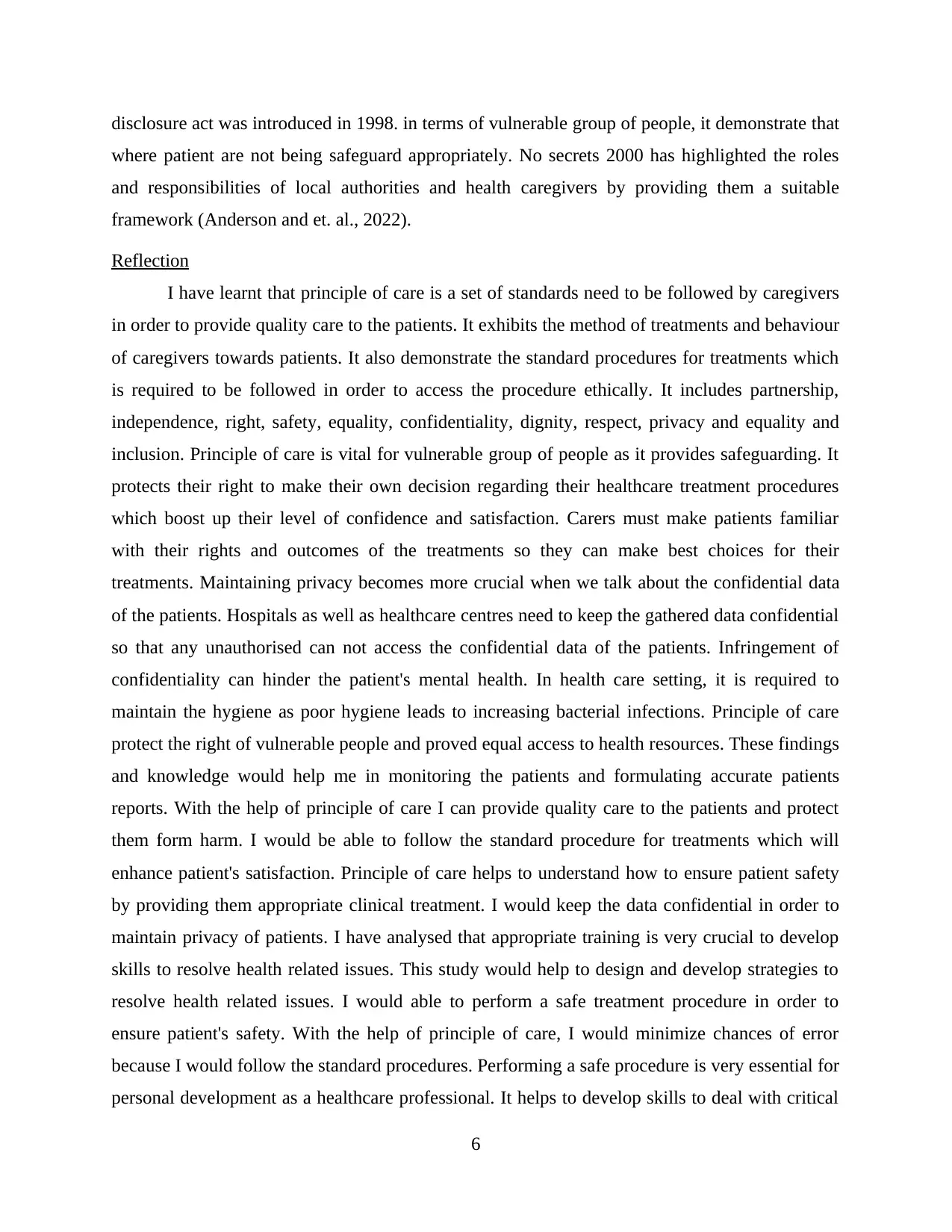
disclosure act was introduced in 1998. in terms of vulnerable group of people, it demonstrate that
where patient are not being safeguard appropriately. No secrets 2000 has highlighted the roles
and responsibilities of local authorities and health caregivers by providing them a suitable
framework (Anderson and et. al., 2022).
Reflection
I have learnt that principle of care is a set of standards need to be followed by caregivers
in order to provide quality care to the patients. It exhibits the method of treatments and behaviour
of caregivers towards patients. It also demonstrate the standard procedures for treatments which
is required to be followed in order to access the procedure ethically. It includes partnership,
independence, right, safety, equality, confidentiality, dignity, respect, privacy and equality and
inclusion. Principle of care is vital for vulnerable group of people as it provides safeguarding. It
protects their right to make their own decision regarding their healthcare treatment procedures
which boost up their level of confidence and satisfaction. Carers must make patients familiar
with their rights and outcomes of the treatments so they can make best choices for their
treatments. Maintaining privacy becomes more crucial when we talk about the confidential data
of the patients. Hospitals as well as healthcare centres need to keep the gathered data confidential
so that any unauthorised can not access the confidential data of the patients. Infringement of
confidentiality can hinder the patient's mental health. In health care setting, it is required to
maintain the hygiene as poor hygiene leads to increasing bacterial infections. Principle of care
protect the right of vulnerable people and proved equal access to health resources. These findings
and knowledge would help me in monitoring the patients and formulating accurate patients
reports. With the help of principle of care I can provide quality care to the patients and protect
them form harm. I would be able to follow the standard procedure for treatments which will
enhance patient's satisfaction. Principle of care helps to understand how to ensure patient safety
by providing them appropriate clinical treatment. I would keep the data confidential in order to
maintain privacy of patients. I have analysed that appropriate training is very crucial to develop
skills to resolve health related issues. This study would help to design and develop strategies to
resolve health related issues. I would able to perform a safe treatment procedure in order to
ensure patient's safety. With the help of principle of care, I would minimize chances of error
because I would follow the standard procedures. Performing a safe procedure is very essential for
personal development as a healthcare professional. It helps to develop skills to deal with critical
6
where patient are not being safeguard appropriately. No secrets 2000 has highlighted the roles
and responsibilities of local authorities and health caregivers by providing them a suitable
framework (Anderson and et. al., 2022).
Reflection
I have learnt that principle of care is a set of standards need to be followed by caregivers
in order to provide quality care to the patients. It exhibits the method of treatments and behaviour
of caregivers towards patients. It also demonstrate the standard procedures for treatments which
is required to be followed in order to access the procedure ethically. It includes partnership,
independence, right, safety, equality, confidentiality, dignity, respect, privacy and equality and
inclusion. Principle of care is vital for vulnerable group of people as it provides safeguarding. It
protects their right to make their own decision regarding their healthcare treatment procedures
which boost up their level of confidence and satisfaction. Carers must make patients familiar
with their rights and outcomes of the treatments so they can make best choices for their
treatments. Maintaining privacy becomes more crucial when we talk about the confidential data
of the patients. Hospitals as well as healthcare centres need to keep the gathered data confidential
so that any unauthorised can not access the confidential data of the patients. Infringement of
confidentiality can hinder the patient's mental health. In health care setting, it is required to
maintain the hygiene as poor hygiene leads to increasing bacterial infections. Principle of care
protect the right of vulnerable people and proved equal access to health resources. These findings
and knowledge would help me in monitoring the patients and formulating accurate patients
reports. With the help of principle of care I can provide quality care to the patients and protect
them form harm. I would be able to follow the standard procedure for treatments which will
enhance patient's satisfaction. Principle of care helps to understand how to ensure patient safety
by providing them appropriate clinical treatment. I would keep the data confidential in order to
maintain privacy of patients. I have analysed that appropriate training is very crucial to develop
skills to resolve health related issues. This study would help to design and develop strategies to
resolve health related issues. I would able to perform a safe treatment procedure in order to
ensure patient's safety. With the help of principle of care, I would minimize chances of error
because I would follow the standard procedures. Performing a safe procedure is very essential for
personal development as a healthcare professional. It helps to develop skills to deal with critical
6
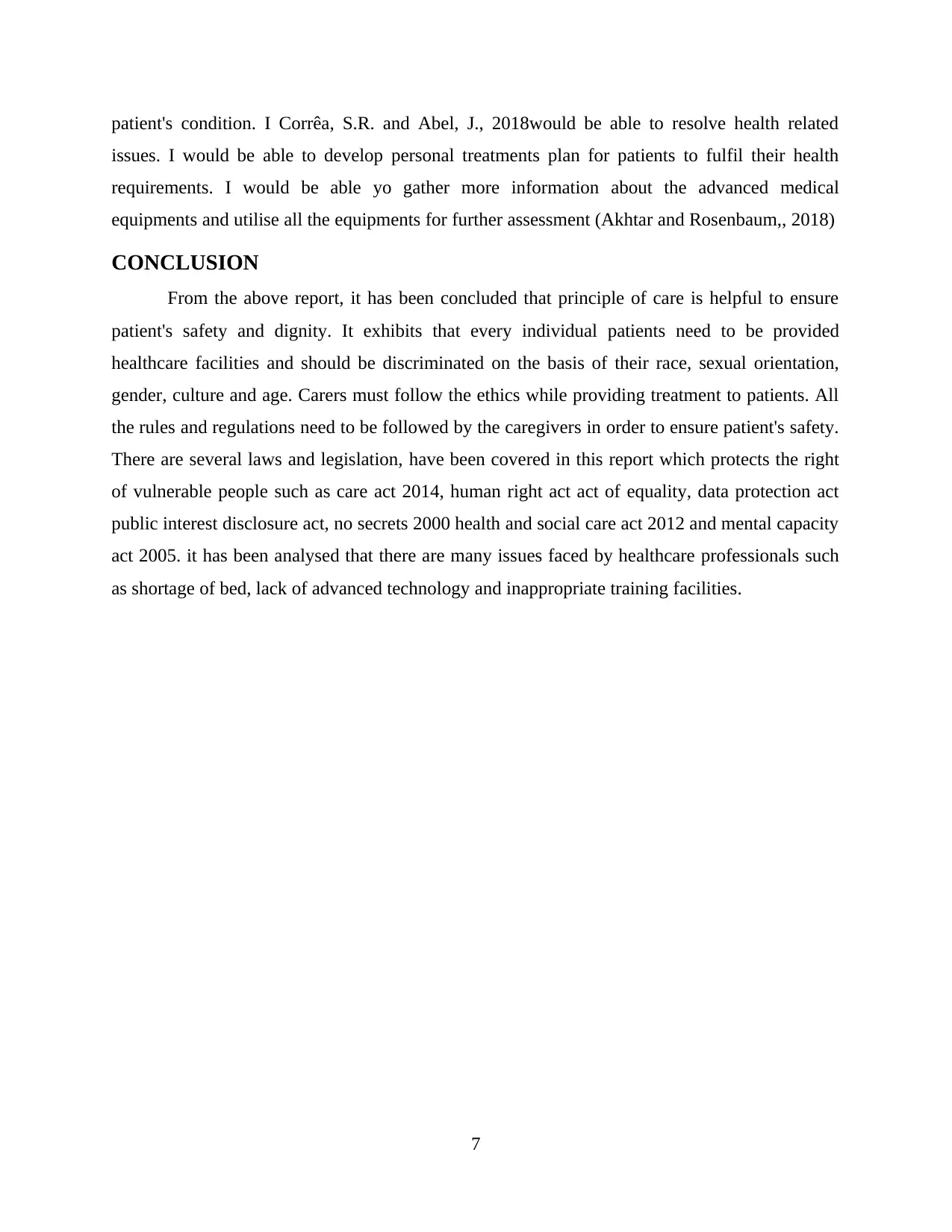
patient's condition. I Corrêa, S.R. and Abel, J., 2018would be able to resolve health related
issues. I would be able to develop personal treatments plan for patients to fulfil their health
requirements. I would be able yo gather more information about the advanced medical
equipments and utilise all the equipments for further assessment (Akhtar and Rosenbaum,, 2018)
CONCLUSION
From the above report, it has been concluded that principle of care is helpful to ensure
patient's safety and dignity. It exhibits that every individual patients need to be provided
healthcare facilities and should be discriminated on the basis of their race, sexual orientation,
gender, culture and age. Carers must follow the ethics while providing treatment to patients. All
the rules and regulations need to be followed by the caregivers in order to ensure patient's safety.
There are several laws and legislation, have been covered in this report which protects the right
of vulnerable people such as care act 2014, human right act act of equality, data protection act
public interest disclosure act, no secrets 2000 health and social care act 2012 and mental capacity
act 2005. it has been analysed that there are many issues faced by healthcare professionals such
as shortage of bed, lack of advanced technology and inappropriate training facilities.
7
issues. I would be able to develop personal treatments plan for patients to fulfil their health
requirements. I would be able yo gather more information about the advanced medical
equipments and utilise all the equipments for further assessment (Akhtar and Rosenbaum,, 2018)
CONCLUSION
From the above report, it has been concluded that principle of care is helpful to ensure
patient's safety and dignity. It exhibits that every individual patients need to be provided
healthcare facilities and should be discriminated on the basis of their race, sexual orientation,
gender, culture and age. Carers must follow the ethics while providing treatment to patients. All
the rules and regulations need to be followed by the caregivers in order to ensure patient's safety.
There are several laws and legislation, have been covered in this report which protects the right
of vulnerable people such as care act 2014, human right act act of equality, data protection act
public interest disclosure act, no secrets 2000 health and social care act 2012 and mental capacity
act 2005. it has been analysed that there are many issues faced by healthcare professionals such
as shortage of bed, lack of advanced technology and inappropriate training facilities.
7
⊘ This is a preview!⊘
Do you want full access?
Subscribe today to unlock all pages.

Trusted by 1+ million students worldwide
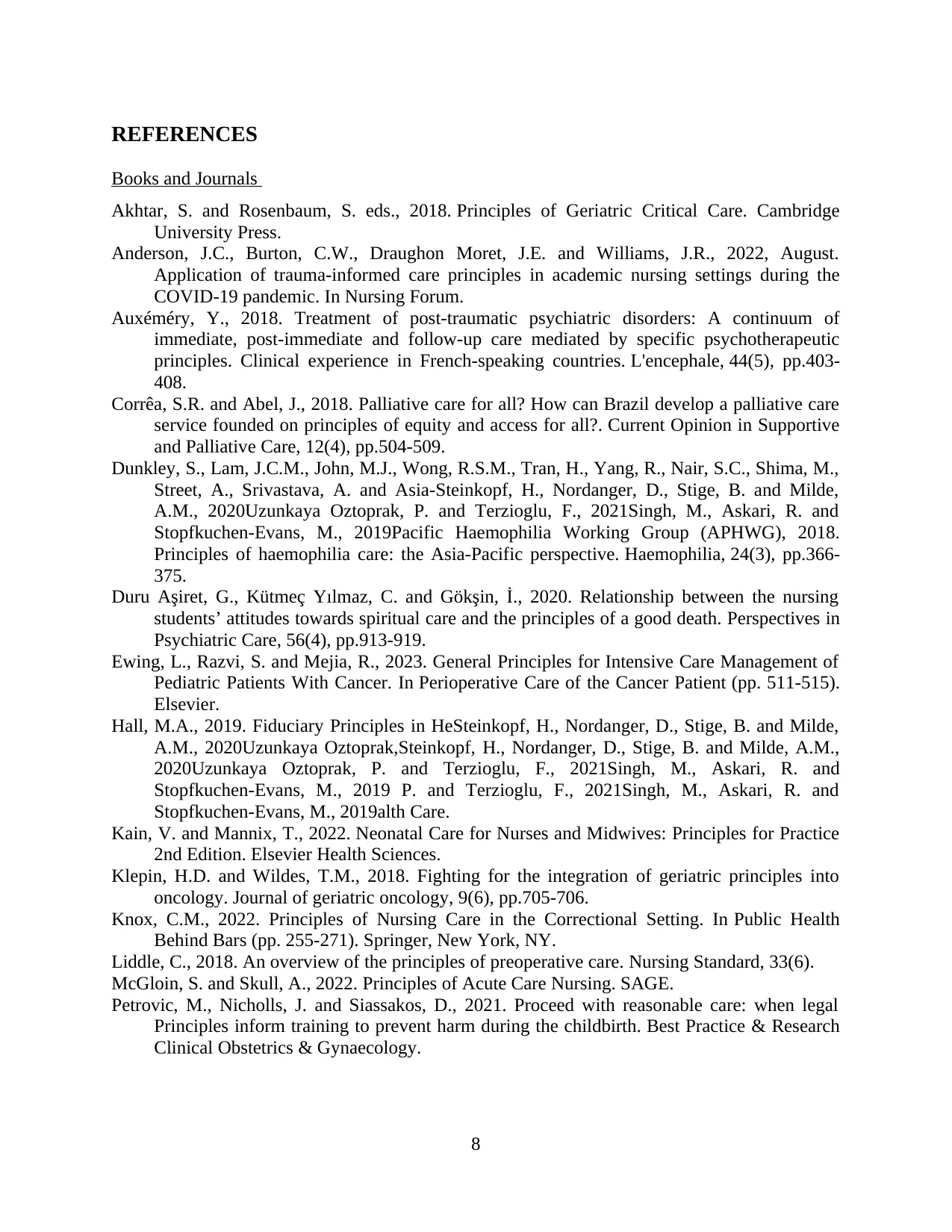
REFERENCES
Books and Journals
Akhtar, S. and Rosenbaum, S. eds., 2018. Principles of Geriatric Critical Care. Cambridge
University Press.
Anderson, J.C., Burton, C.W., Draughon Moret, J.E. and Williams, J.R., 2022, August.
Application of trauma‐informed care principles in academic nursing settings during the
COVID‐19 pandemic. In Nursing Forum.
Auxéméry, Y., 2018. Treatment of post-traumatic psychiatric disorders: A continuum of
immediate, post-immediate and follow-up care mediated by specific psychotherapeutic
principles. Clinical experience in French-speaking countries. L'encephale, 44(5), pp.403-
408.
Corrêa, S.R. and Abel, J., 2018. Palliative care for all? How can Brazil develop a palliative care
service founded on principles of equity and access for all?. Current Opinion in Supportive
and Palliative Care, 12(4), pp.504-509.
Dunkley, S., Lam, J.C.M., John, M.J., Wong, R.S.M., Tran, H., Yang, R., Nair, S.C., Shima, M.,
Street, A., Srivastava, A. and Asia‐Steinkopf, H., Nordanger, D., Stige, B. and Milde,
A.M., 2020Uzunkaya Oztoprak, P. and Terzioglu, F., 2021Singh, M., Askari, R. and
Stopfkuchen-Evans, M., 2019Pacific Haemophilia Working Group (APHWG), 2018.
Principles of haemophilia care: the Asia‐Pacific perspective. Haemophilia, 24(3), pp.366-
375.
Duru Aşiret, G., Kütmeç Yılmaz, C. and Gökşin, İ., 2020. Relationship between the nursing
students’ attitudes towards spiritual care and the principles of a good death. Perspectives in
Psychiatric Care, 56(4), pp.913-919.
Ewing, L., Razvi, S. and Mejia, R., 2023. General Principles for Intensive Care Management of
Pediatric Patients With Cancer. In Perioperative Care of the Cancer Patient (pp. 511-515).
Elsevier.
Hall, M.A., 2019. Fiduciary Principles in HeSteinkopf, H., Nordanger, D., Stige, B. and Milde,
A.M., 2020Uzunkaya Oztoprak,Steinkopf, H., Nordanger, D., Stige, B. and Milde, A.M.,
2020Uzunkaya Oztoprak, P. and Terzioglu, F., 2021Singh, M., Askari, R. and
Stopfkuchen-Evans, M., 2019 P. and Terzioglu, F., 2021Singh, M., Askari, R. and
Stopfkuchen-Evans, M., 2019alth Care.
Kain, V. and Mannix, T., 2022. Neonatal Care for Nurses and Midwives: Principles for Practice
2nd Edition. Elsevier Health Sciences.
Klepin, H.D. and Wildes, T.M., 2018. Fighting for the integration of geriatric principles into
oncology. Journal of geriatric oncology, 9(6), pp.705-706.
Knox, C.M., 2022. Principles of Nursing Care in the Correctional Setting. In Public Health
Behind Bars (pp. 255-271). Springer, New York, NY.
Liddle, C., 2018. An overview of the principles of preoperative care. Nursing Standard, 33(6).
McGloin, S. and Skull, A., 2022. Principles of Acute Care Nursing. SAGE.
Petrovic, M., Nicholls, J. and Siassakos, D., 2021. Proceed with reasonable care: when legal
Principles inform training to prevent harm during the childbirth. Best Practice & Research
Clinical Obstetrics & Gynaecology.
8
Books and Journals
Akhtar, S. and Rosenbaum, S. eds., 2018. Principles of Geriatric Critical Care. Cambridge
University Press.
Anderson, J.C., Burton, C.W., Draughon Moret, J.E. and Williams, J.R., 2022, August.
Application of trauma‐informed care principles in academic nursing settings during the
COVID‐19 pandemic. In Nursing Forum.
Auxéméry, Y., 2018. Treatment of post-traumatic psychiatric disorders: A continuum of
immediate, post-immediate and follow-up care mediated by specific psychotherapeutic
principles. Clinical experience in French-speaking countries. L'encephale, 44(5), pp.403-
408.
Corrêa, S.R. and Abel, J., 2018. Palliative care for all? How can Brazil develop a palliative care
service founded on principles of equity and access for all?. Current Opinion in Supportive
and Palliative Care, 12(4), pp.504-509.
Dunkley, S., Lam, J.C.M., John, M.J., Wong, R.S.M., Tran, H., Yang, R., Nair, S.C., Shima, M.,
Street, A., Srivastava, A. and Asia‐Steinkopf, H., Nordanger, D., Stige, B. and Milde,
A.M., 2020Uzunkaya Oztoprak, P. and Terzioglu, F., 2021Singh, M., Askari, R. and
Stopfkuchen-Evans, M., 2019Pacific Haemophilia Working Group (APHWG), 2018.
Principles of haemophilia care: the Asia‐Pacific perspective. Haemophilia, 24(3), pp.366-
375.
Duru Aşiret, G., Kütmeç Yılmaz, C. and Gökşin, İ., 2020. Relationship between the nursing
students’ attitudes towards spiritual care and the principles of a good death. Perspectives in
Psychiatric Care, 56(4), pp.913-919.
Ewing, L., Razvi, S. and Mejia, R., 2023. General Principles for Intensive Care Management of
Pediatric Patients With Cancer. In Perioperative Care of the Cancer Patient (pp. 511-515).
Elsevier.
Hall, M.A., 2019. Fiduciary Principles in HeSteinkopf, H., Nordanger, D., Stige, B. and Milde,
A.M., 2020Uzunkaya Oztoprak,Steinkopf, H., Nordanger, D., Stige, B. and Milde, A.M.,
2020Uzunkaya Oztoprak, P. and Terzioglu, F., 2021Singh, M., Askari, R. and
Stopfkuchen-Evans, M., 2019 P. and Terzioglu, F., 2021Singh, M., Askari, R. and
Stopfkuchen-Evans, M., 2019alth Care.
Kain, V. and Mannix, T., 2022. Neonatal Care for Nurses and Midwives: Principles for Practice
2nd Edition. Elsevier Health Sciences.
Klepin, H.D. and Wildes, T.M., 2018. Fighting for the integration of geriatric principles into
oncology. Journal of geriatric oncology, 9(6), pp.705-706.
Knox, C.M., 2022. Principles of Nursing Care in the Correctional Setting. In Public Health
Behind Bars (pp. 255-271). Springer, New York, NY.
Liddle, C., 2018. An overview of the principles of preoperative care. Nursing Standard, 33(6).
McGloin, S. and Skull, A., 2022. Principles of Acute Care Nursing. SAGE.
Petrovic, M., Nicholls, J. and Siassakos, D., 2021. Proceed with reasonable care: when legal
Principles inform training to prevent harm during the childbirth. Best Practice & Research
Clinical Obstetrics & Gynaecology.
8
Paraphrase This Document
Need a fresh take? Get an instant paraphrase of this document with our AI Paraphraser
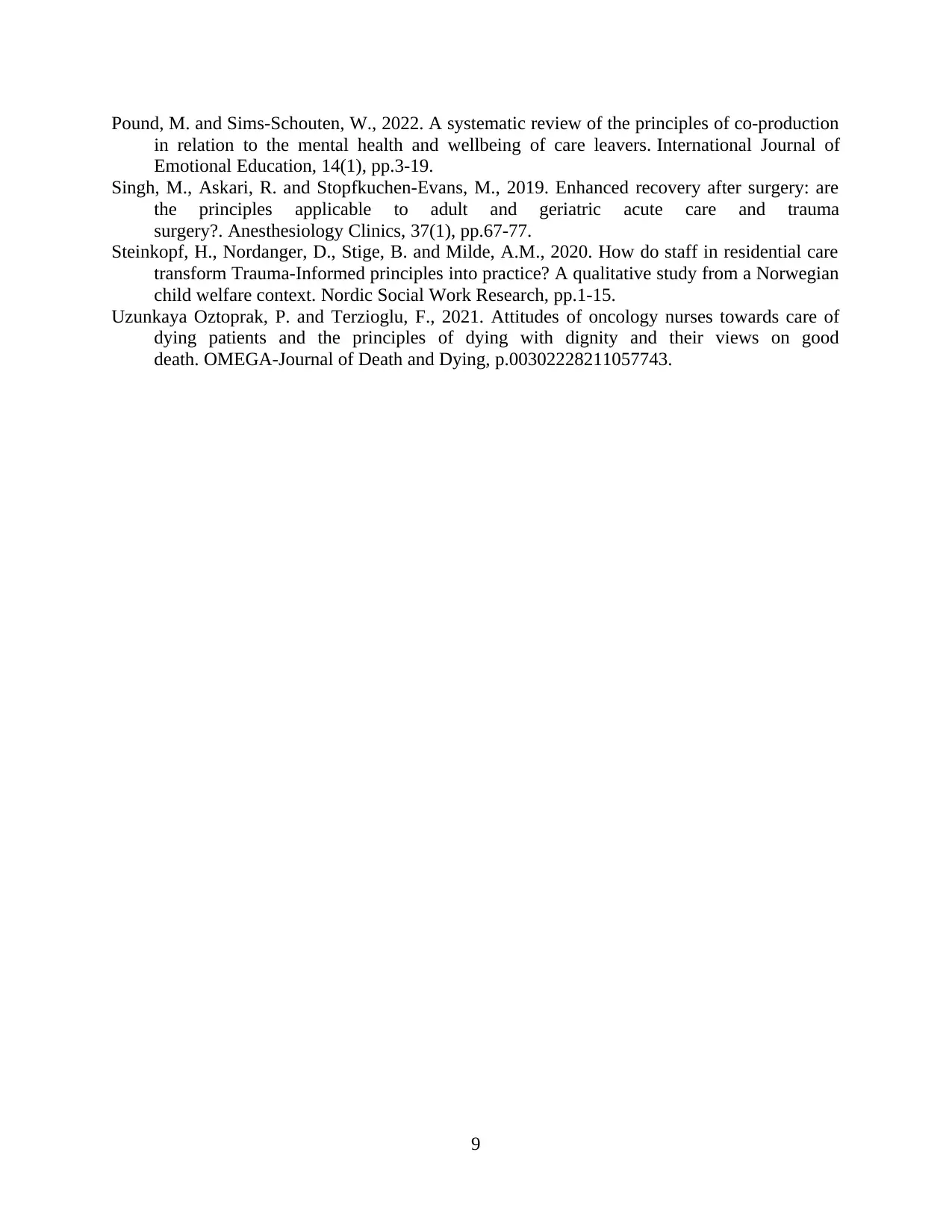
Pound, M. and Sims-Schouten, W., 2022. A systematic review of the principles of co-production
in relation to the mental health and wellbeing of care leavers. International Journal of
Emotional Education, 14(1), pp.3-19.
Singh, M., Askari, R. and Stopfkuchen-Evans, M., 2019. Enhanced recovery after surgery: are
the principles applicable to adult and geriatric acute care and trauma
surgery?. Anesthesiology Clinics, 37(1), pp.67-77.
Steinkopf, H., Nordanger, D., Stige, B. and Milde, A.M., 2020. How do staff in residential care
transform Trauma-Informed principles into practice? A qualitative study from a Norwegian
child welfare context. Nordic Social Work Research, pp.1-15.
Uzunkaya Oztoprak, P. and Terzioglu, F., 2021. Attitudes of oncology nurses towards care of
dying patients and the principles of dying with dignity and their views on good
death. OMEGA-Journal of Death and Dying, p.00302228211057743.
9
in relation to the mental health and wellbeing of care leavers. International Journal of
Emotional Education, 14(1), pp.3-19.
Singh, M., Askari, R. and Stopfkuchen-Evans, M., 2019. Enhanced recovery after surgery: are
the principles applicable to adult and geriatric acute care and trauma
surgery?. Anesthesiology Clinics, 37(1), pp.67-77.
Steinkopf, H., Nordanger, D., Stige, B. and Milde, A.M., 2020. How do staff in residential care
transform Trauma-Informed principles into practice? A qualitative study from a Norwegian
child welfare context. Nordic Social Work Research, pp.1-15.
Uzunkaya Oztoprak, P. and Terzioglu, F., 2021. Attitudes of oncology nurses towards care of
dying patients and the principles of dying with dignity and their views on good
death. OMEGA-Journal of Death and Dying, p.00302228211057743.
9

10
⊘ This is a preview!⊘
Do you want full access?
Subscribe today to unlock all pages.

Trusted by 1+ million students worldwide
1 out of 12
Related Documents
Your All-in-One AI-Powered Toolkit for Academic Success.
+13062052269
info@desklib.com
Available 24*7 on WhatsApp / Email
![[object Object]](/_next/static/media/star-bottom.7253800d.svg)
Unlock your academic potential
Copyright © 2020–2026 A2Z Services. All Rights Reserved. Developed and managed by ZUCOL.





